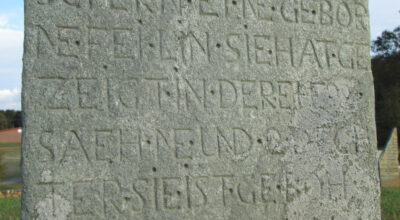God understands the pain, joy that comes with being human
Published 12:00 am Saturday, December 28, 2013
I woke up in the wee hours of the morning, too early to get up and get started on the day. If I didn’t go back to sleep, I would be dragging.
But sleep was elusive. Bodily awareness was pervasive. I needed to use the bathroom, so I got up. I was thirsty, so I drank some water before going back to bed.
Once I got back in bed, I was too hot, so I changed nightclothes. Still, I was wide awake.
I lay in bed wondering why I was having trouble sleeping. Maybe because I hadn’t gotten enough exercise recently. Maybe because the out-of-date yogurt I had eaten before going to bed was doing strange things to my digestive system.
I became aware not just of the physical sensations, but my emotional state. I was melancholy, and I couldn’t figure out why. Maybe it was because I was lying awake in the dark. Maybe it was because of something going on in my neurological system that I don’t have the capacity to understand, much less explain.
Maybe because inexplicable emotions are as much a part of being human as are uncontrollable bodily sensations. Maybe because it’s all part and parcel of having human flesh.
In the beginning was the Word, and the Word was with God, and the Word was God… And the Word became flesh and lived among us…(John 1:1, 14).
On Christmas we celebrated the incarnation of God. We claimed and put our hope in our belief that the divine being who created the entire universe became embodied in human flesh.
Christmas cards and carols romanticize that claim. They show us pictures of a refreshed young mother holding a clean, sleeping infant.
The lyrics of a favorite children’s hymn tells us that “the little Lord Jesus, no crying he makes.”
It’s an appealing picture, but it’s nonsense.
Real babies cry. They wake up wailing in the middle of the night because real babies get hungry. And after they are fed, they burp and poop and spit their milk up on their exhausted mothers.
Those things are part and parcel of being a human infant, part and parcel of having newborn flesh.
If we really believe that the Word of God became human flesh, then we believe that the baby who was the incarnation of God did all those things that other babies do.
The Word became flesh and lived among us. As he grew, the incarnate Word of God experienced all the traumas and trials that other children do.
At times, his face was flushed with fever. His stomach ached from intestinal viruses.
When he played, he stumped his toe. He fell down and scraped his knees. He got bruised and bloody and dirty and muddy because that’s part and parcel of being a real boy.
And later, he experienced the bodily changes that come with puberty and the rush of hormones that are part and parcel of adolescence. That’s what it is to be human.
The Word became flesh and lived among us. The incarnate Word of God grew to be a man.
He knew the ache of overworked muscles and the pleasure that comes with a good massage.
He felt the pangs of hunger and the satisfaction of a well prepared meal.
He experienced the feel of wind blowing through his hair and smelled the scent of flowers in the spring breeze.
At times he was bone weary, and at other times, his heart ached.
The incarnate Word experienced not just the physical sensations of human existence, but all the emotions that are part and parcel of being human.
He loved, just as we do, and lost those he loved, just as we do. He knew what it was like to live, and he learned what it was like to die.
The Word became flesh and lived among us. That’s such an important theological claim, because we are flesh.
We are not disembodied consciousness. And we don’t just have bodies. We are bodies. What happens to our bodies, happens to us.
And we claim that in Christ, God became embodied, too. In Christ, God was more than disembodied consciousness, more than a spiritual force.
Through Christ, God became limited in time and space. Through Christ, God knows all that is part and parcel of being human. God knows.
Whatever ecstasy we experience, whatever suffering we endure, God knows what we are going through.
We don’t need to clean up the stable where the baby Jesus slept. We don’t need to clean up the cross where the man Jesus died. We don’t need to clean up what happened in-between.
And we don’t need to pretend our own messy lives are something they are not, because the Word became flesh and lived among us.
The embodied God is no stranger to burps and bumps and bruises, heartaches and headaches, trials and triumphs.
God is at home among the clutter of our living rooms and the chaos of our hearts because God knows what it is like to be human— really human.
So celebrate. Have a party. And welcome the incarnate Word into your less than perfect life.
The Rev. Dr. Barrie Miller Kirby is pastor of Spencer Presbyterian Church.


